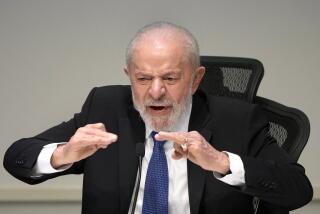Lula Will Need Ties to U.S.
- Share via
In his fourth attempt, Luiz Inacio Lula da Silva is close to winning the presidency of Brazil, the world’s eighth-largest economy. Lula took 46% of the vote in the first round of the election Sunday and is the clear favorite in the Oct. 27 runoff. Not bad for a man born in Brazil’s impoverished northeast who couldn’t attend high school and had to go to work at an early age to help support his family.
Lula rose to become the head of the metalworkers union and of the largest leftist political party in Latin America. He’s been friends with Cuban dictator Fidel Castro and Venezuelan demagogue Hugo Chavez. But now he says he’s changed.
Can this socialist who says he has reinvented himself be trusted to govern the largest country in South America? Brazilians seem to believe he can, and they had better be right because his success matters -- not just to 170 million Brazilians but to other countries in the region and to the United States.
Mexico’s 1994 economic crisis reverberated throughout the hemisphere -- the so-called “tequila effect.” Argentina’s more recent economic woes spurred milder troubles across South America -- the “tango effect.” If Brazil’s economy goes south, with its $240-billion debt, the “samba effect” will create financial havoc worldwide.
Despite the debt, outgoing President Fernando Henrique Cardoso did a good job. He established a free-market economy in Brazil and his tight fiscal discipline reduced inflation to less than 10% from an absurd percentage ranging into the thousands. On his watch, new health programs significantly drove down infant mortality. He made progress in education, and even though the country’s economy did not grow, poverty was diminished.
Lula has campaigned on the promise of change but has not been specific about how he would change Brazil. Let’s hope he knows by now that going back to a pre-Cardoso era of protected markets, state monopolies and government-managed industries wouldn’t help.
Instead, Lula should try to get close to the United States. He needs to stay away from the populist temptation to spend money and should abandon any immediate plans to raise wages, lower domestic taxes or impose higher import tariffs. Without strict fiscal discipline, inflation would once again spiral and everyone in Brazil -- especially the poor -- would be hurt. To inspire trust in the international financial markets, it is also imperative that Lula choose competent, internationally recognized economists for his fiscal and financial team, people who would help him devise plans to jump into free-trade agreements that could help increase the country’s exports.
The Bush administration should take a prudent but friendly approach to Lula and seek an early meeting. That would signal to the international financial community that Washington would cooperate with the formerly bombastic socialist Lula.
More to Read
Sign up for Essential California
The most important California stories and recommendations in your inbox every morning.
You may occasionally receive promotional content from the Los Angeles Times.










